13 Best Herbal Teas For Osteoarthritis
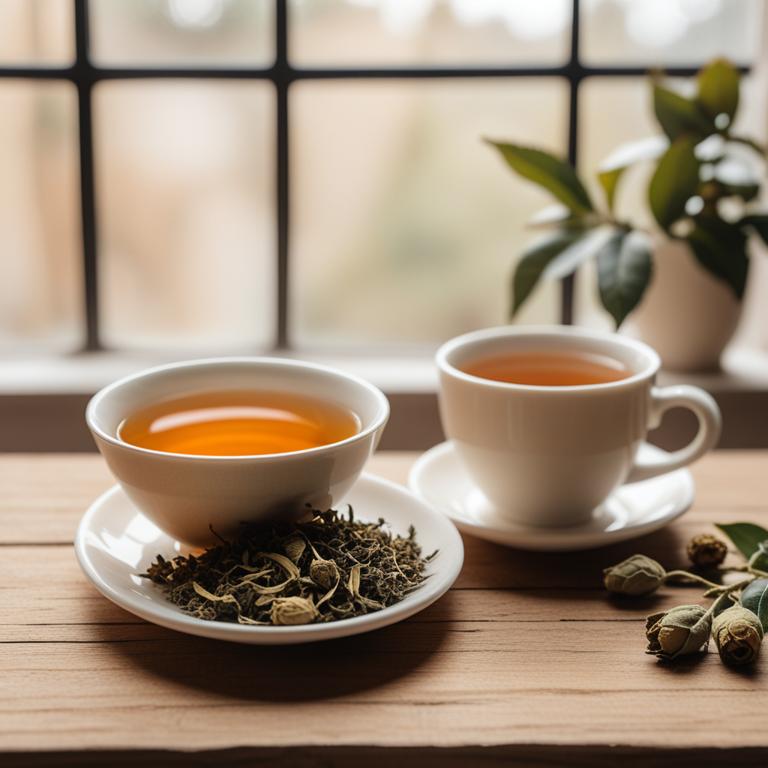
Herbal teas for Osteoarthritis are a type of natural remedy that involves the consumption of tea made from various herbs to alleviate the symptoms of osteoarthritis, a degenerative joint disease characterized by joint pain and stiffness.
These herbal teas can treat osteoarthritis by reducing inflammation, improving joint mobility, and relaxing the muscles, all of which can be attributed to their anti-inflammatory and antioxidant properties.
Some examples of herbal teas that can help treat osteoarthritis include ginger tea, which has anti-inflammatory compounds that reduce pain and inflammation; turmeric tea, which contains curcumin that has potent anti-inflammatory and antioxidant effects; peppermint tea, which helps relax muscles and reduce pain; rosemary tea, which has anti-inflammatory compounds that reduce pain and inflammation; chamomile tea, which has anti-inflammatory and antioxidant properties that help relax muscles and reduce pain; willow bark tea, which contains salicin, a compound similar to aspirin that reduces pain and inflammation; and ginseng tea, which improves joint mobility and reduces pain.
By incorporating these herbal teas into their daily routine, individuals with osteoarthritis can experience significant relief from their symptoms and improve their overall quality of life.
Related Study
According to "Rheumatology (Oxford, England)", teas for osteoarthritis may be a safe and effective treatment option due to the promising evidence found for the use of some herbal preparations, including teas, in reducing symptoms and non-steroidal anti-inflammatory drug consumption.
Below there's a list of the 13 best herbal teas for osteoarthritis.
Table of Contents
- 1. Curcuma longa teas
- 2. Zingiber officinale teas
- 3. Ginkgo biloba teas
- 4. Glycyrrhiza glabra teas
- 5. Achillea millefolium teas
- 6. Rheum officinale teas
- 7. Rheum palmatum teas
- 8. Equisetum arvense teas
- 9. Rosmarinus officinalis teas
- 10. Cinchona officinalis teas
- 11. Lavandula angustifolia teas
- 12. Salvia miltiorrhiza teas
- 13. Zanthoxylum bungeanum teas
Also, you may be interested in...
Today Free Bonus!
The Ultimate Herb Drying Checklist
(For Long-Lasting Powerful Medicinal Effect)
How to easily dry herbs that don't mold and that keep their strong medicinal power for more than 1 year.
1. Curcuma longa teas

Curcuma longa teas have been traditionally used to treat osteoarthritis, a degenerative joint disease characterized by inflammation and pain.
The anti-inflammatory and antioxidant properties of this herbal preparation help to reduce joint inflammation and pain, thus alleviating the symptoms of osteoarthritis.
The bioactive constituents, particularly curcumin, a polyphenolic compound, and gingerols, have been shown to inhibit the production of pro-inflammatory enzymes and cytokines, thereby reducing joint inflammation and promoting joint health.
The benefits of Curcuma longa teas in treating osteoarthritis include reduced joint pain and inflammation, improved joint mobility, and enhanced overall quality of life, making it a promising natural remedy for managing this debilitating condition.
Related Study
According to "Molecular biology reports", Curcuma longa teas for osteoarthritis may have potential benefits, including up-regulating antioxidant potential, inhibiting cartilage degradation, down-regulating inflammatory cytokines such as NF-kB, IL-6, and TNF-α, and suppressing oxidative stress.
Recipe:
- Gather 1 cup of water and 1/2 teaspoon of dried Curcuma longa root powder in a saucepan.
- Heat the water over medium heat until it boils.
- Reduce heat and add the Curcuma longa root powder. Let it simmer for 5-7 minutes.
- Strain the tea into a cup and discard the solids. Add honey or lemon to taste.
- Drink the tea 1-2 times a day, preferably after meals, to help manage osteoarthritis symptoms.
Curcuma longa teas can be effective in treating osteoarthritis, but possible side effects may include stomach upset, diarrhea, and dizziness due to its active compound curcumin's potential interaction with blood thinners and its anti-inflammatory properties.
To use Curcuma longa teas safely, take precautions such as starting with small doses, avoiding use with other anti-inflammatory medications, and being cautious when consuming it with blood thinners like warfarin or aspirin.
Curcuma Longa Tea on Amazon
Pure Ceylon Turmeric Brew - 100% Organic Ceylon Turmeric Tea Bags (40 Sachets - pack of 2 – 20 COUNT PER BOX)
Disclaimer: We earn a commission if you click this link and make a purchase at no additional cost to you.
2. Zingiber officinale teas

Zingiber officinale teas, also known as ginger teas, have been traditionally used to treat osteoarthritis, a common joint disorder characterized by inflammation and degeneration of joint cartilage.
The anti-inflammatory and analgesic properties of ginger teas help to reduce pain and inflammation in the affected joints, thereby alleviating the symptoms of osteoarthritis.
The bioactive constituents of ginger, such as gingerols and shogaols, have been shown to inhibit the production of pro-inflammatory enzymes and cytokines, which contribute to the development of osteoarthritis.
Regular consumption of ginger teas has been found to provide relief from osteoarthritis symptoms, improve joint mobility, and reduce the reliance on pain medications.
Related Study
According to Phytotherapy Research: PTR, Zingiber officinale teas for osteoarthritis showed improvement of pain over placebo.
Recipe:
- Gather 1 cup of fresh ginger root (about 3-4 inches long) and 2 cups of water.
- Peel the ginger root and chop it into small pieces.
- Boil the 2 cups of water in a medium saucepan.
- Add the chopped ginger to the boiling water and reduce heat to low. Let it simmer for 5-7 minutes.
- Strain the tea into a cup and drink 1/2 cup, 2-3 times a day to help relieve osteoarthritis symptoms.
Zingiber officinale teas can provide relief from osteoarthritis symptoms, but potential side effects may include nausea, diarrhea, and dizziness due to its active compounds such as gingerols and shogaols.
To safely use Zingiber officinale teas to treat osteoarthritis, it is essential to start with small doses, monitor blood pressure, and avoid consuming it before surgery or with blood-thinning medications, as it may interact with these substances and exacerbate the condition.
Zingiber Officinale Tea on Amazon
FGO Organic Ginger Tea, 100 Count, Eco-Conscious Tea Bags, Caffeine Free, Packaging May Vary (Pack of 1)
Disclaimer: We earn a commission if you click this link and make a purchase at no additional cost to you.
3. Ginkgo biloba teas

Ginkgo biloba teas have been explored for their potential in treating osteoarthritis, a degenerative joint disease characterized by cartilage breakdown and inflammation.
The anti-inflammatory and antioxidant properties of ginkgo biloba teas are believed to help alleviate the symptoms of osteoarthritis by reducing joint pain and inflammation, and protecting against oxidative stress.
The bioactive constituents of ginkgo biloba, including flavonoids and terpenoids, are thought to contribute to its therapeutic effects, with flavonoids exhibiting anti-inflammatory and antioxidant activity, and terpenoids displaying anti-inflammatory and analgesic properties.
Regular consumption of ginkgo biloba teas may offer benefits in managing osteoarthritis symptoms, including reduced joint pain and improved mobility, although more research is needed to confirm its efficacy.
Recipe:
- Gather 1 teaspoon of dried Ginkgo biloba leaves and 1 cup of boiling water.
- Steep the leaves in the boiling water for 5-7 minutes. Strain the mixture.
- Add 1 tablespoon of honey to the tea, if desired, for taste. Stir well.
- Drink 1 cup of the tea 2-3 times a day, as needed. You can store the tea in the fridge for up to 24 hours.
- Consult with a healthcare professional before using Ginkgo biloba for osteoarthritis treatment, especially if you're taking other medications.
Ginkgo biloba teas can be beneficial in treating osteoarthritis, but possible side effects may include gastrointestinal issues, such as nausea, diarrhea, and stomach pain, as well as allergic reactions, headaches, and dizziness.
To use Ginkgo biloba teas safely, individuals should start with a low dose, monitor their body's response, and avoid consuming it with other medications, especially blood thinners, as it may increase the risk of bleeding.
Ginkgo Biloba Tea on Amazon
Tai Chi Think Sharp Energizing Tea (Ginseng Ginkgo Biloba) 12 Bags
Disclaimer: We earn a commission if you click this link and make a purchase at no additional cost to you.
4. Glycyrrhiza glabra teas

Glycyrrhiza glabra teas, derived from the licorice plant, have been traditionally used to treat osteoarthritis due to their anti-inflammatory and anti-arthritic properties.
The bioactive constituents, including glycyrrhizin and flavonoids, help to reduce joint pain and inflammation, thereby alleviating the symptoms of osteoarthritis.
Glycyrrhiza glabra teas exert their therapeutic effects by inhibiting the production of pro-inflammatory enzymes and cytokines, which contribute to the progression of osteoarthritis.
The benefits of using Glycyrrhiza glabra teas to treat osteoarthritis include reduced joint pain, improved mobility, and a decrease in the reliance on non-steroidal anti-inflammatory drugs (NSAIDs).
Recipe:
- Gather ingredients: 1 cup of dried Glycyrrhiza glabra roots, 1 quart of water, and a strainer.
- Combine the dried roots and water in a large pot. Bring the mixture to a boil.
- Reduce heat and let it simmer for 10-15 minutes. Strain the mixture using the strainer.
- Discard the solids and let the tea cool. Use 2-3 tablespoons of the tea in a cup, depending on your desired strength.
- Drink the tea 2-3 times a day, with meals, to help manage osteoarthritis symptoms.
Glycyrrhiza glabra teas can be used to treat osteoarthritis symptoms due to their anti-inflammatory properties, but possible side effects may include hypertension, edema, and electrolyte imbalances, particularly when consumed in large quantities or for extended periods.
To minimize these risks, it is recommended to monitor blood pressure, avoid excessive consumption, and be cautious of interactions with other medications, especially those affecting cardiovascular or renal systems.
Glycyrrhiza Glabra Tea on Amazon
Pukka Herbal Teas Licorice and Cinnamon - 20 Bags, 20 Count
Disclaimer: We earn a commission if you click this link and make a purchase at no additional cost to you.
5. Achillea millefolium teas

Achillea millefolium teas, also known as yarrow tea, have been traditionally used to treat osteoarthritis, a degenerative joint disease characterized by pain, stiffness, and inflammation.
The anti-inflammatory and analgesic properties of yarrow tea are attributed to its bioactive constituents, including sesquiterpenoids, flavonoids, and phenolic acids, which help to reduce joint inflammation and alleviate pain.
The herbal preparation helps to treat osteoarthritis by inhibiting the production of pro-inflammatory cytokines and enzymes, thereby reducing joint damage and improving mobility.
Regular consumption of yarrow tea has been shown to provide relief from osteoarthritis symptoms, including reduced pain and improved joint function, making it a valuable natural remedy for managing this debilitating condition.
Related Study
According to "Rheumatology (Oxford, England)", Achillea millefolium teas may be a promising option for the effective treatment of osteoarthritis, as it shows potential in reducing consumption of non-steroidal anti-inflammatory drugs.
Recipe:
- Gather 2 cups of fresh or dried Achillea millefolium leaves and flowers.
- Use a tea infuser or a heat-resistant cup to steep 2 teaspoons of the leaves and flowers in 1 cup of boiling water for 5-7 minutes.
- Strain the tea into a separate cup and discard the solids.
- Add honey to taste, if desired, and stir well.
- Drink 1-2 cups of the tea per day, as needed, to help alleviate osteoarthritis symptoms.
Achillea millefolium teas can be used to treat osteoarthritis, but possible side effects may include gastrointestinal upset, such as nausea and diarrhea, as well as allergic reactions, including skin rashes and itching.
To minimize potential side effects, it is recommended to start with a low dose and gradually increase as needed, and to avoid consuming Achillea millefolium teas if you have any underlying health conditions, such as bleeding disorders or ulcers, or if you are taking medications that may interact with the herbal preparation.
Achillea Millefolium Tea on Amazon
Biokoma Pure and Organic Yarrow Dried Herb 30 Tea Bags 1.5oz In Resealable Moisture Proof Pouch, USDA Certified Organic - Herbal Tea, No Additives, No Preservatives, No GMO, Kosher
Disclaimer: We earn a commission if you click this link and make a purchase at no additional cost to you.
6. Rheum officinale teas
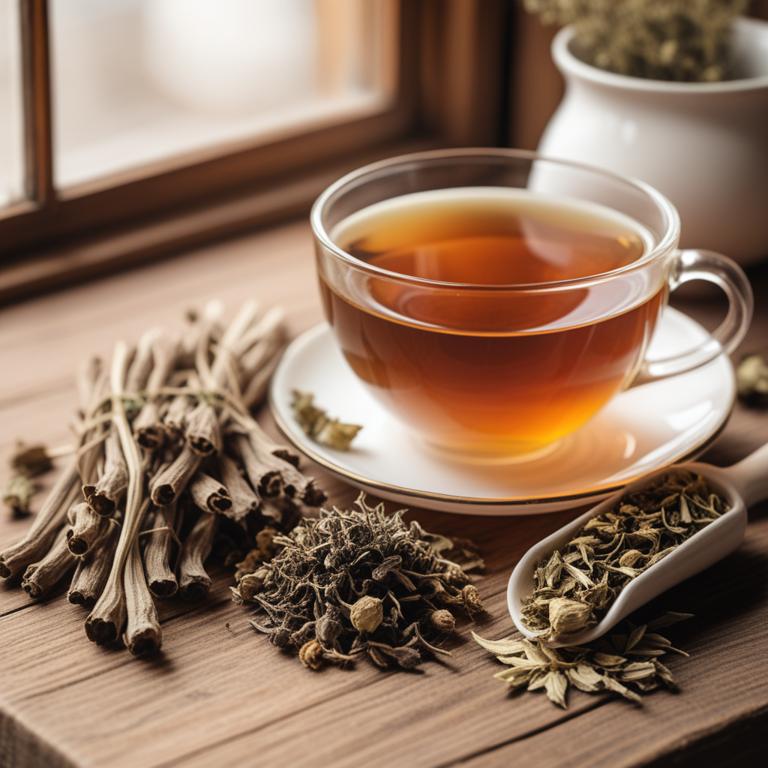
Rheum officinale teas have been used in traditional medicine to treat osteoarthritis, a debilitating condition characterized by joint pain and inflammation.
The anti-inflammatory and analgesic properties of Rheum officinale teas, which are attributed to its bioactive constituents such as flavonoids, alkaloids, and glycosides, help to reduce joint pain and inflammation.
By inhibiting the production of pro-inflammatory enzymes and cytokines, Rheum officinale teas help to alleviate the symptoms of osteoarthritis, promoting joint health and mobility.
The benefits of using Rheum officinale teas to treat osteoarthritis include reduced reliance on nonsteroidal anti-inflammatory drugs (NSAIDs) and improved quality of life for individuals suffering from this chronic condition.
Recipe:
- Gather 2 tablespoons of dried Rheum officinale roots and 1 cup of boiling water.
- Steep the Rheum officinale roots in the boiling water for 5-7 minutes.
- Strain the mixture and discard the roots.
- Add 1 tablespoon of honey (optional) to the tea and mix well.
- Drink the tea 1-2 times a day, as needed, for relief from osteoarthritis symptoms.
Rheum officinale teas can be used to treat osteoarthritis, but it may cause side effects such as stomach upset, diarrhea, and allergic reactions in some individuals, especially when consumed in large quantities or for extended periods.
To minimize potential side effects, it is recommended to start with small doses, monitor your body's response, and avoid combining Rheum officinale teas with other medications or substances that may interact with its active compounds.
7. Rheum palmatum teas
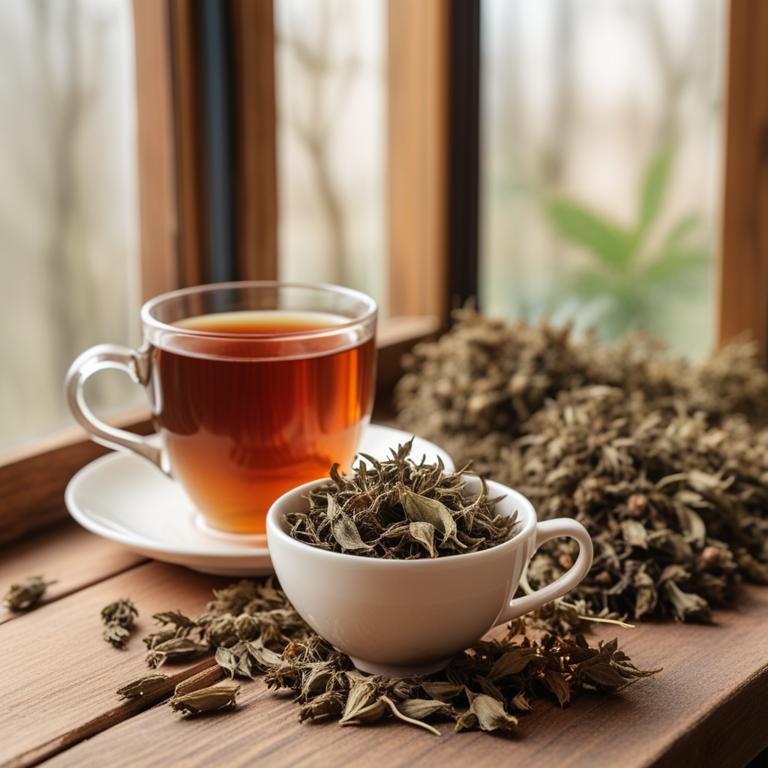
Rheum palmatum teas, also known as Chinese rhubarb or Da Huang, have been traditionally used to treat osteoarthritis due to their anti-inflammatory and analgesic properties.
The herbal preparation helps to treat osteoarthritis by reducing joint inflammation and pain, as well as improving joint mobility and reducing stiffness.
The bioactive constituents of Rheum palmatum teas, such as anthraquinones and tannins, have been found to have potent anti-inflammatory and antioxidant effects, which contribute to their therapeutic benefits.
The benefits of using Rheum palmatum teas to treat osteoarthritis include reduced pain and inflammation, improved joint function, and enhanced overall quality of life.
Recipe:
- Gather Rheum palmatum roots and dry them completely.
- Use 10 grams of dried Rheum palmatum roots and grind them into a fine powder.
- Add 1 cup of water to a pot and bring it to a boil.
- Add 2 teaspoons of the Rheum palmatum powder to the boiling water and reduce heat to low.
- Steep for 10-15 minutes, then strain and drink 1 cup of tea, 2-3 times a day.
Rheum palmatum teas can be used to treat osteoarthritis, but its use may be associated with side effects such as gastrointestinal upset, allergic reactions, and interactions with other medications.
Precautions should be taken when using this herbal preparation, including avoiding excessive consumption, which may lead to digestive problems, and being cautious of potential interactions with blood-thinning medications, such as warfarin.
8. Equisetum arvense teas
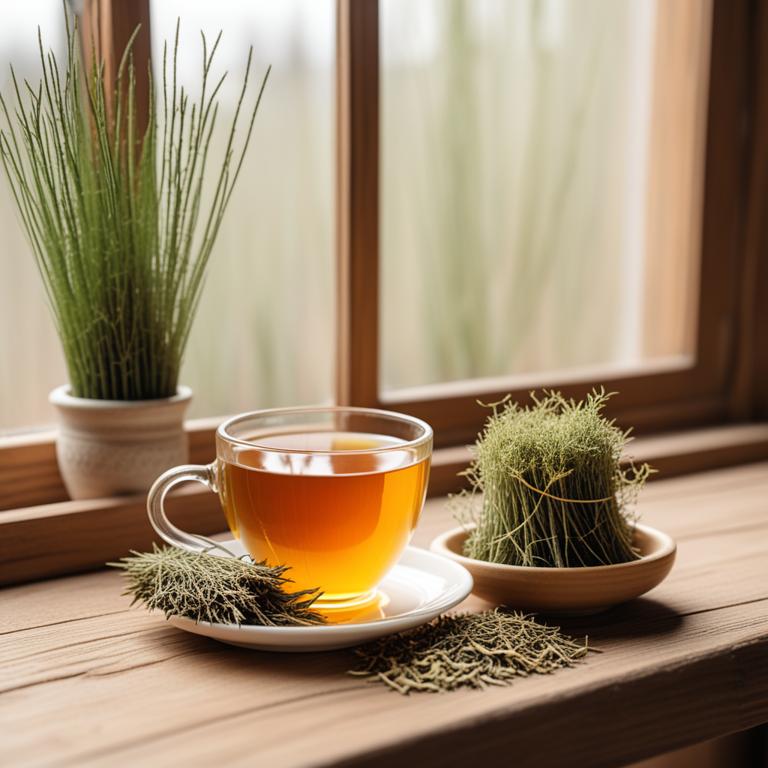
Equisetum arvense teas have been traditionally used to treat osteoarthritis, a degenerative joint disease characterized by joint pain and inflammation.
The anti-inflammatory and analgesic properties of Equisetum arvense teas help to reduce joint pain and inflammation, thereby alleviating the symptoms of osteoarthritis.
The bioactive constituents, including flavonoids, phenolic acids, and saponins, in Equisetum arvense teas are responsible for its therapeutic effects, which help to reduce oxidative stress and inflammation in the joints.
By consuming Equisetum arvense teas, individuals with osteoarthritis may experience benefits such as reduced joint pain, improved mobility, and enhanced overall quality of life.
Recipe:
- Gather 2 tablespoons of dried Equisetum arvense roots and stems.
- Boil 1 cup of water in a pot.
- Add the 2 tablespoons of Equisetum arvense to the boiling water.
- Reduce heat and let it simmer for 5-7 minutes.
- Strain the tea and drink 1/2 cup, 2-3 times a day.
Equisetum arvense teas can be used to treat osteoarthritis, but it may cause side effects such as stomach upset, diarrhea, and allergic reactions in some individuals due to its high silica content.
Precautions should be taken when using this herbal preparation, including limiting the duration of treatment to avoid interactions with other medications and being aware of potential interactions with other health conditions, such as kidney or liver issues.
9. Rosmarinus officinalis teas

Rosmarinus officinalis teas have been traditionally used to treat osteoarthritis due to their anti-inflammatory and antioxidant properties.
The bioactive constituents of this herbal preparation, including rosmarinic acid, carnosic acid, and camphor, help to reduce pain and inflammation associated with osteoarthritis.
These compounds have been shown to inhibit the production of pro-inflammatory enzymes and cytokines, thereby alleviating symptoms of osteoarthritis, such as joint pain and stiffness.
Drinking Rosmarinus officinalis teas may provide relief from osteoarthritis symptoms, making it a beneficial herbal remedy for individuals suffering from this ailment.
Recipe:
- Gather 1 cup of fresh or dried Rosmarinus officinalis leaves.
- Measure 1 tablespoon of the leaves and place them in a clean tea infuser or a heat-resistant cup.
- Pour 1 cup of boiling water over the leaves and let it steep for 5-7 minutes.
- Strain the tea into another cup and discard the leaves. Add honey or lemon to taste, if desired.
- Drink 1-2 cups of the tea per day, preferably after meals, to help with osteoarthritis symptoms.
Rosmarinus officinalis teas can be used to treat osteoarthritis, but possible side effects may include stomach upset, nausea, and allergic reactions such as skin rashes or itching.
Precautions when using Rosmarinus officinalis teas include taking them in moderation, avoiding consumption with other medications, and being aware of potential interactions with certain medical conditions, such as high blood pressure or epilepsy.
Rosmarinus Officinalis Tea on Amazon
Palm Beach Medicinal Herbs - Rosemary Tea - Pure Herbal Tea Series, 30ct
Disclaimer: We earn a commission if you click this link and make a purchase at no additional cost to you.
10. Cinchona officinalis teas

Cinchona officinalis teas have been used for centuries to treat various health conditions, including osteoarthritis.
The anti-inflammatory and analgesic properties of this herbal preparation help to reduce pain and inflammation associated with osteoarthritis, allowing individuals to manage their symptoms and improve their quality of life.
The bioactive constituents of Cinchona officinalis, such as quinine and alkaloids, contribute to its therapeutic effects by inhibiting pain pathways and reducing inflammation.
Regular consumption of Cinchona officinalis teas has been shown to provide benefits in treating osteoarthritis, including improved joint mobility, reduced pain, and enhanced overall well-being.
Recipe:
- Gather 2 tablespoons of dried Cinchona officinalis bark and 1 cup of boiling water.
- Put the Cinchona bark in a tea infuser or a small piece of cheesecloth.
- Steep the Cinchona bark in the boiling water for 5-7 minutes.
- Strain the mixture and discard the Cinchona bark. Let it cool.
- Drink 1/2 cup of the tea 2-3 times a day for relief from osteoarthritis symptoms.
Cinchona officinalis teas can be used to treat osteoarthritis, but may cause potential side effects such as dizziness, nausea, and stomach upset due to its high quinine content.
Precautions should be taken when consuming Cinchona officinalis teas, as excessive intake may lead to interactions with other medications, worsen kidney or liver function, and cause allergic reactions, so it's recommended to monitor your body's response and adjust your dosage accordingly.
Cinchona Officinalis Tea on Amazon
Quina Roja(chinona) & Palo de Víbora Tea – 100% Natural, Vegan, Hecho en México | 25 Tea Bags
Disclaimer: We earn a commission if you click this link and make a purchase at no additional cost to you.
11. Lavandula angustifolia teas

Lavandula angustifolia teas, also known as English lavender tea, have been traditionally used to treat osteoarthritis due to their anti-inflammatory and antioxidant properties.
The herbal preparation helps to treat osteoarthritis by reducing inflammation and pain in the joints, as well as promoting relaxation and reducing stress levels.
The bioactive constituents of Lavandula angustifolia teas, including linalool and linalyl acetate, contribute to its therapeutic effects by inhibiting the production of pro-inflammatory enzymes and reducing oxidative stress.
The benefits of using Lavandula angustifolia teas to treat osteoarthritis include reduced pain and inflammation, improved sleep quality, and enhanced overall well-being.
Recipe:
- Gather 1 cup of fresh Lavandula angustifolia flowers or 2 tablespoons of dried flowers.
- Combine the flowers with 1 cup of boiling water in a heat-resistant cup.
- Steep the mixture for 5-7 minutes. Let it sit and allow the flavors to mix.
- Strain the tea into a cup using a fine-mesh sieve or cheesecloth. Discard the solids.
- Drink the tea 2-3 times a day, ideally before meals. You can add honey or lemon to taste.
Lavandula angustifolia teas can be used as a natural remedy to alleviate the symptoms of osteoarthritis, but it may cause side effects such as gastrointestinal upset, dizziness, and allergic reactions in some individuals.
To use this herbal preparation safely, it is recommended to start with a low dose and gradually increase as needed, and to avoid using it if you have a history of seizures or are taking medications that may interact with it, such as antacids, sedatives, and anticoagulants.
Lavandula Angustifolia Tea on Amazon
Tiesta Tea - Lavender Chamomile Herbal Tea | Loose Leaf | Calming Blend with Chamomile and Lavender | Caffeine-Free Herbal | Great for Hot or Iced Brews | Resealable Bulk Pouch, 200 Cups | 8 Ounce
Disclaimer: We earn a commission if you click this link and make a purchase at no additional cost to you.
12. Salvia miltiorrhiza teas
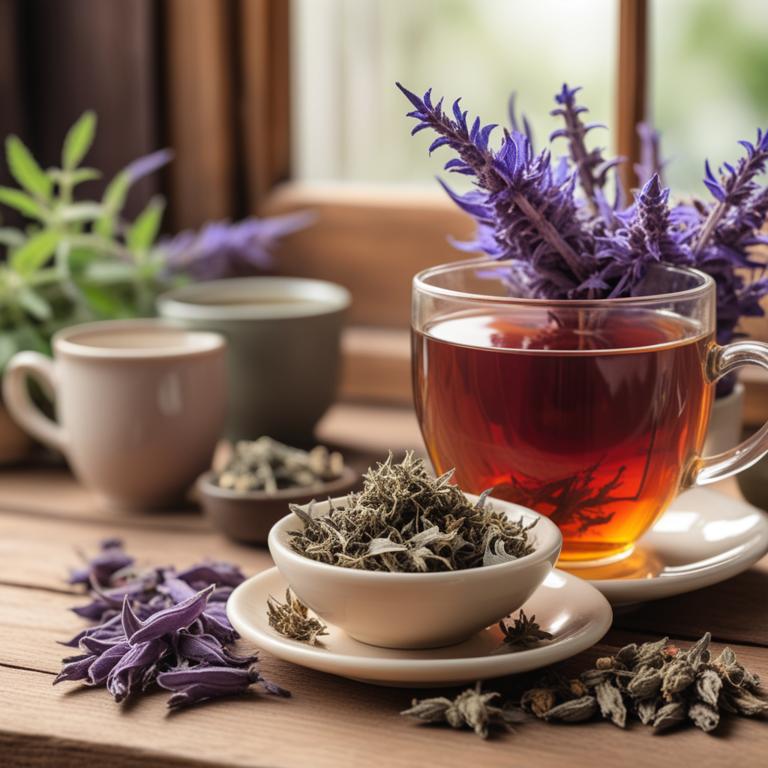
Salvia miltiorrhiza teas have been used in traditional Chinese medicine to treat osteoarthritis, a degenerative joint disease characterized by joint pain and stiffness.
The herbal preparation contains bioactive constituents such as tanshinones, phenolic acids, and flavonoids that exhibit anti-inflammatory, antioxidant, and chondroprotective properties, which help to reduce joint pain and inflammation.
Salvia miltiorrhiza teas work by inhibiting the production of pro-inflammatory cytokines, promoting the production of cartilage matrix, and improving blood flow to the affected joints, thereby alleviating symptoms of osteoarthritis.
Regular consumption of Salvia miltiorrhiza teas has been shown to provide significant relief from osteoarthritis symptoms, improve joint function, and enhance overall quality of life in patients with this condition.
Recipe:
- Gather 1 cup of dried Salvia miltiorrhiza root and 2 cups of boiling water.
- Measure 1 tablespoon of the dried root and add it to a heat-resistant cup.
- Pour 2 cups of boiling water over the root and let it steep for 5-10 minutes.
- Strain the liquid and discard the root. Let the tea cool down.
- Drink 1/2 to 1 cup of the tea 2-3 times a day, after consulting with a doctor or healthcare professional.
Salvia miltiorrhiza teas can be effective in treating osteoarthritis due to its anti-inflammatory and antioxidant properties, but possible side effects may include dizziness, nausea, and gastrointestinal upset in some individuals.
To minimize potential side effects, it's essential to use Salvia miltiorrhiza teas in moderation, ideally in small amounts and for a short duration, and to monitor your body's reaction closely, avoiding use if you experience any severe or persistent symptoms.
13. Zanthoxylum bungeanum teas
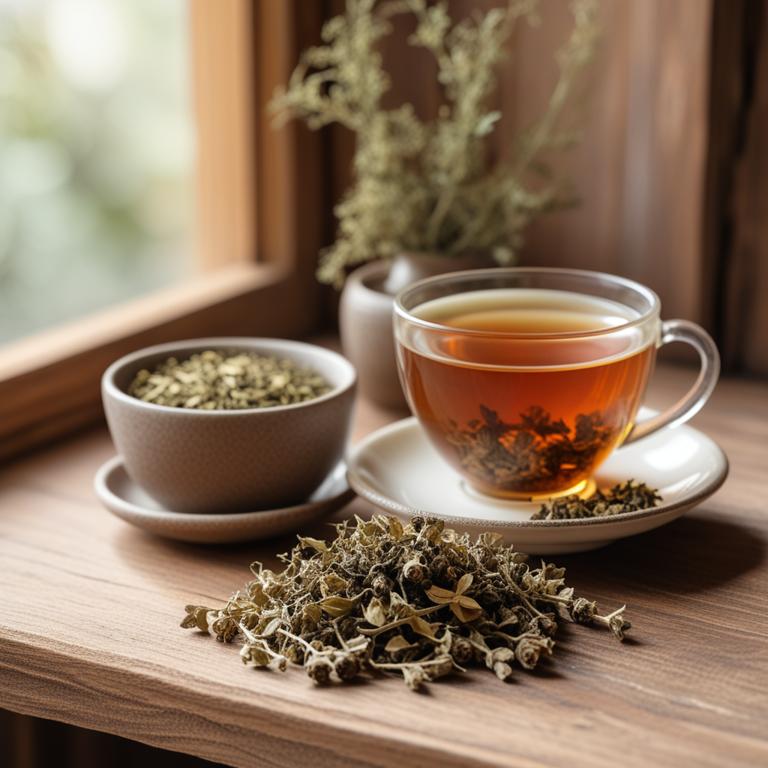
Zanthoxylum bungeanum teas have been traditionally used to treat osteoarthritis, a degenerative joint disease characterized by joint pain and inflammation.
The anti-inflammatory and analgesic properties of this herbal preparation help to reduce joint pain and swelling, thereby alleviating the symptoms of osteoarthritis.
Bioactive constituents such as ferulic acid, isorhapontigenin, and kaempferol present in Zanthoxylum bungeanum teas have been found to inhibit the production of pro-inflammatory mediators, thereby exerting a protective effect on joints.
The benefits of using Zanthoxylum bungeanum teas to treat osteoarthritis include reduced pain and inflammation, improved joint mobility, and a lower risk of developing secondary complications associated with this condition.
Recipe:
- Gather 30g of dried Zanthoxylum bungeanum leaves and 1 cup of water.
- Boil the water in a pot and let it cool for 5 minutes.
- Add 30g of dried Zanthoxylum bungeanum leaves to a tea infuser or a heat-resistant cup.
- Pour the cooled water over the leaves and let it steep for 5-7 minutes.
- Strain the tea and drink 1-2 cups a day for relief from osteoarthritis symptoms.
Zanthoxylum bungeanum teas can be used to treat osteoarthritis, but consuming them may result in side effects such as dizziness, nausea, and diarrhea due to their high concentration of compounds that can interact with the digestive system.
To minimize potential side effects, it is essential to start with small doses and gradually increase the amount as needed, and to avoid consuming the teas before or after consuming heavy meals to prevent digestive discomfort.